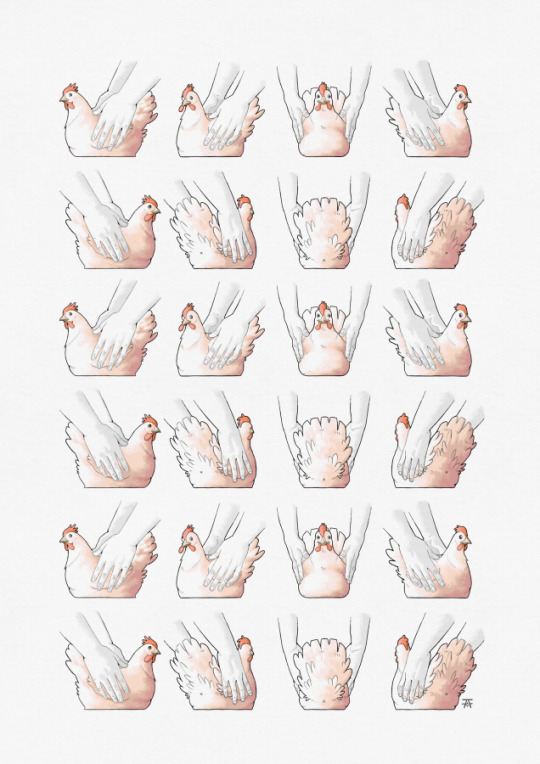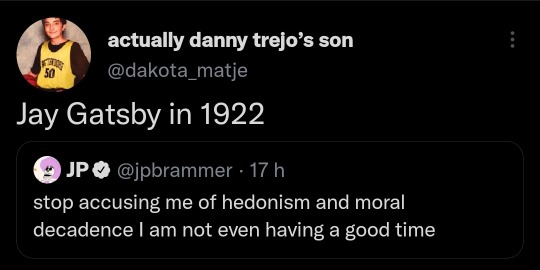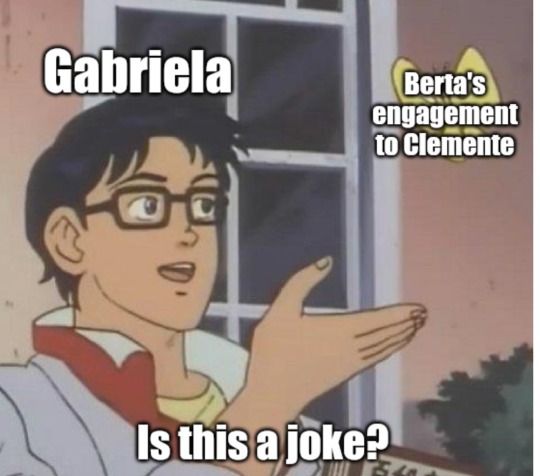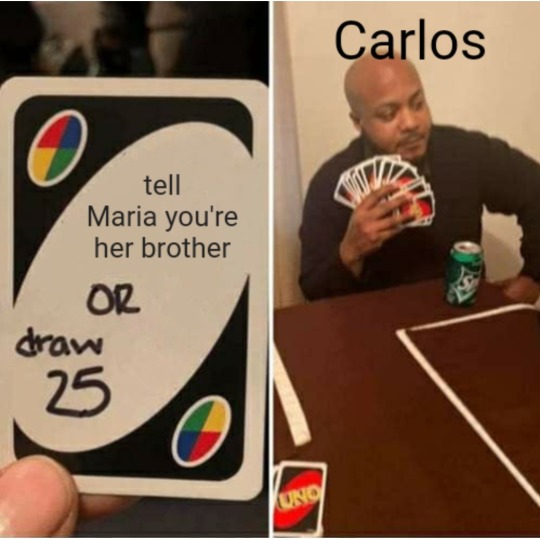Text

Meming every chapter from Os Maias, by Eça de Queiroz
Chapter One
0 notes
Text

"muitos anos a virar frangos" 2023
this one's my favorite.
"muitos anos a virar frangos" translates roughly to "many years spent turning chickens". it references chicken grilling.
it is a very, very portuguese way to express one's experience or mastery over something. it is used often as a brag and in an humorous way, sometimes sarcastically.
this illustration is part of "quem fala assim não é mudo" - "he who speaks like this isn't mute", my first solo exhibition, where i illustrate typical portuguese sayings and expressions.
this is the last of the collection. if you got this far, thank you for reading! i hope you enjoyed it!
instagram | my website
274 notes
·
View notes
Text
Maia task: you must deliver the information, but at the cost of plunging your whole life into massive chaos (which happens sooner or later anyway)
the fact that we only have “herculean task” and “sisyphean task” feels so limiting. so here’s a few more tasks for your repertoire
icarian task: when you have a task you know you’re going to fail at anyways, so why not have some fun with it before it all comes crashing down
cassandrean task: when you have to deal with people you KNOW won’t listen to you, despite having accurate information, and having to watch them fumble about when you told them the solution from the start (most often witnessed in customer service)
feel free to chime in i ran out of ideas much faster than i anticipated
104K notes
·
View notes
Text
Also João da Ega in 1875

47K notes
·
View notes
Text
This is poetry
you have invited strangers into your home, helen pevensie, mother of four.
without the blurred sight of joy and relief, it has become impossible to ignore. all the love inside you cannot keep you from seeing the truth. your children are strangers to you. the country has seen them grow taller, your youngest daughter’s hair much longer than you would have it all years past. their hands have more strength in them, their voices ring with an odd lilt and their eyes—it has become hard to look at them straight on, hasn’t it? your children have changed, helen, and as much as you knew they would grow a little in the time away from you, your children have become strangers.
your youngest sings songs you do not know in a language that makes your chest twist in odd ways. you watch her dance in floating steps, bare feet barely touching the dewy grass. when you try and make her wear her sister’s old shoes—growing out of her own faster than you think she ought to—, she looks at you as though you are the child instead of her. her fingers brush leaves with tenderness, and you swear your daughter’s gentle hum makes the drooping plant stand taller than before. you follow her eager leaps to her siblings, her enthusiasm the only thing you still recognise from before the country. yet, she laughs strangely, no longer the giggling girl she used to be but free in a way you have never seen. her smile can drop so fast now, her now-old eyes can turn distant and glassy, and her tears, now rarer, are always silent. it scares you to wonder what robbed her of the heaving sobs a child ought to make use of in the face of upset.
your other daughter—older than your youngest yet still at an age that she cannot be anything but a child—smiles with all the knowledge in the world sitting in the corner of her mouth. her voice is even, without all traces of the desperate importance her peers carry still, that she used to fill her siblings’ ears with at all hours of the day. she folds her hands in her lap with patience and soothes the ache of war in your mind before you even realise she has started speaking. you watch her curl her hair with careful, steady fingers and a straight back, her words a melody as she tells your eldest which move to make without so much a glance at the board off to her right. she reads still, and what a relief you find this sliver of normalcy, even if she’s started taking notes in a shorthand you couldn’t even think to decipher. even if you feel her slipping away, now more like one of the young, confident women in town than a child desperately wishing for a mother’s approval.
your younger son reads plenty as well these days, and it fills you with pride. he is quiet now, sitting still when you find him bent over a book in the armchair of his father. he looks at you with eyes too knowing for a petulant child on the cusp of puberty, and no longer beats his fists against the furniture when one of his siblings dares approach him. he has settled, you realise one evening when you walk into the living room and find him writing in a looping script you don’t recognise, so different from the scratched signature he carved into the doors of your pantry barely a year ago. he speaks sense to your youngest and eldest, respects their contributions without jest. you watch your two middle children pass a book back and forth, each a pen in hand and sheets of paper bridging the gap between them, his face opening up with a smile rather than a scowl. it freezes you mid-step to find such simple joy in him. remember when you sent them away, helen, and how long it had been since he allowed you to see a smile then?
your eldest doesn’t sleep anymore. none of your children care much for bedtimes these days, but at least sleep still finds them. it’s not restful, you know it from the startled yelps that fill the house each night, but they sleep. your eldest makes sure of it. you have not slept through a night since the war began, so it’s easy to discover the way he wanders the halls like a ghost, silent and persistent in a duty he carries with pride. each door is opened, your children soothed before you can even think to make your own way to their beds. his voice sounds deeper than it used to, deeper still than you think possible for a child his age and size. then again, you are never sure if the notches on his door frame are an accurate way to measure whatever it is that makes you feel like your eldest has grown beyond your reach. you watch him open doors, soothe your children, spend his nights in the kitchen, his hands wrapped around a cup of tea with a weariness not even the war should bring to him, not after all the effort you put into keeping him safe.
your children mostly talk to each other now, in a whispered privacy you cannot hope to be a part of. their arms no longer fit around your waist. your daughters are wilder—even your older one, as she carries herself like royalty, has grown teeth too sharp for polite society— and they no longer lean into your hands. your sons are broad-shouldered even before their shirts start being too small again, filling up space you never thought was up for taking. your eldest doesn’t sleep, your middle children take notes when politicians speak on the wireless and shake their heads as though they know better, and your youngest sings for hours in your garden.
who are your children now, helen pevensie, and who pried their childhood out of your shaking hands?
35K notes
·
View notes
Text
My neutral expression makes me look like I'm always in a bad mood, which is convenient because it's usually true.
Jorge, probably
#julio dinis#portuguese literature meme#the gentleman of moorish house#jorge negrão vilar de corvos#incorrect quotes
0 notes
Text
Ega: Let's do that game where we switch the initials of our names! Eoão da Jga
Carlos: Marlos da Caia
Alencar: Aomás de Tlencar
Maria: Maria da Mai—
Maria: This is a stupid game anyway
0 notes
Text
Genie: I will grant you as many wishes as you want, as long as you can state them in a single cohesive, logical yet beautiful sentence.
José Saramago: *rolls up his sleeves*
#portuguese literature meme#jose saramago#saramago#his sentences are like a million miles#yet somehow feel like poetry
1 note
·
View note
Text
“It’s been a long time since I’ve been me.”
— Fernando Pessoa
185 notes
·
View notes
Text

#the gentleman of moorish house#gabriela de bacelos#berta da povoa#clemente#julio dinis#portuguese literature meme
0 notes
Text
Jane Austen really said ‘I respect the “I can fix him” movement but that’s just not me. He’ll fix himself if knows what’s good for him’ and that’s why her works are still calling the shots today.
224K notes
·
View notes
Text
Cecília: What are the hardest things to say?
Manuel: I need help
Antónia: I was wrong
Fortunato: Worcestershire sauce
#an english family#cecilia quintino#manuel quintino#antonia#jose fortunato#julio dinis#portuguese literature meme
1 note
·
View note
Text
"Do not suppose I am what I am not, or don't say what you don't feel."
Berta, Chapter X ("Os Fidalgos da Casa Mourisca")
0 notes
Text
•́ ‿ ,•̀ poor me

0 notes
Text

7 notes
·
View notes
Text
I'm really glad "fight me" has replaced "sue me" in the common vernacular because I don't have any money, but I do have fists and I am always angry
Cecília Quintino, probably
0 notes
Text
Richard: You’re charged with… breaking into a pet store?
Charles: I thought the animals might be lonely
0 notes